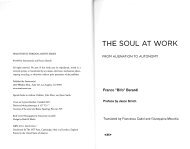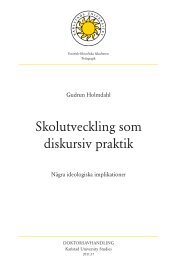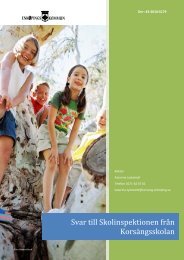FULLTEXT01
FULLTEXT01
FULLTEXT01
You also want an ePaper? Increase the reach of your titles
YUMPU automatically turns print PDFs into web optimized ePapers that Google loves.
fact they are historically specific offers of certain ways of thinking, which could<br />
have “been thought of differently” (Börjesson, 2003, s. 20, own translation).<br />
For example, many of the perspectives on school development refer to<br />
democratic ideals and invoke also social improvement and a humanistic and<br />
liberal discourse.<br />
Wetherell and Potter (1992) mean ideology to be something that occurs also in<br />
scientific contexts and that science must for that reason be made accessible for<br />
critical attention. Such critical attention can be understood as some sort of<br />
deconstruction of the processes and discursive practices, which help to fixate<br />
some claims and to ascribe them authority as neutral fact and truth.<br />
Background<br />
School development, as a branch or discursive practice, serves both as a kind of<br />
entrance to this thesis and as a general description of the empirical approach.<br />
The thesis is based on a heterogenic empirical textual material which debates<br />
school development in one way or another, directly or indirectly linked to a<br />
specific collaborative school research development project. The project took<br />
place between 2003 and 2008. Participating partners in the collaboration were<br />
the Swedish National Agency for School Improvement, Karlstad University,<br />
Dalarna University and 13 municipalities in Sweden. The project was thus part<br />
of the discursive practice roughly described above. When I use the concept<br />
school development it is referred to a combination of school development and<br />
research on school development (school development research). I participated<br />
myself as a graduate student in the project mentioned above and in that respect<br />
contributed to the discursive practice.<br />
Framework and reservations for this study<br />
This study has not been performed with the intention of claiming that all the<br />
talk about school development does not have any relevance or to suggest that<br />
the strategies and perspectives on school development that are offered as part<br />
of that talk, would not have the qualifications to work just so. The study is<br />
based on an idea that the ideological potential of arguments occurs, develops<br />
and changes in discursive practices and not anywhere else or at any abstract<br />
level. Therefore the ideological potential of arguments should be studied where<br />
171






